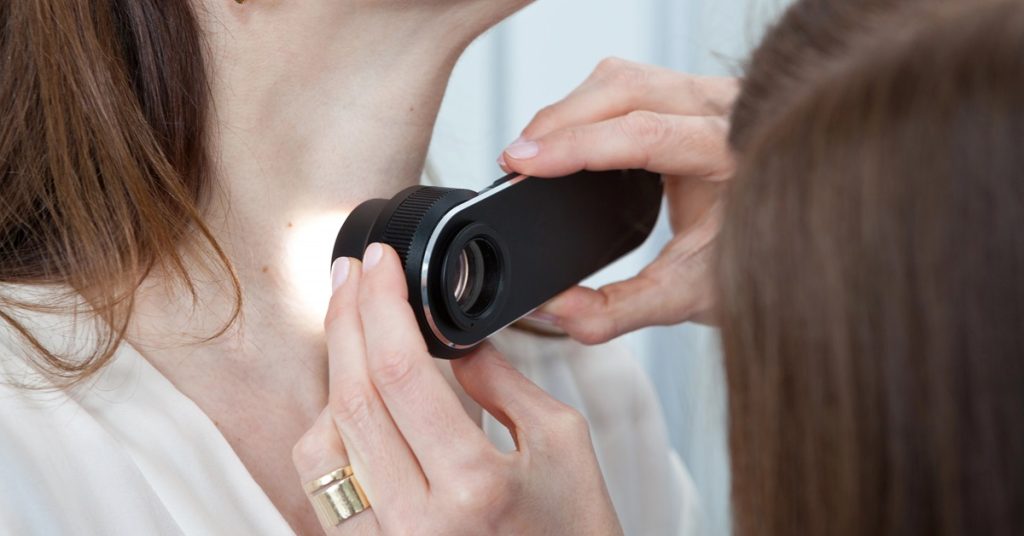A Beginner’s Guide To Dermatology (plus 6 tips to prepare you for a visit)

Do you have bothersome dry, scaly skin? Maybe it’s relentless acne or seemingly incurable dandruff.
If so, you’re not alone. Skin diseases are ranked as the fourth most common cause of human illness. And given how visible most skin conditions are, it can be quite distressing:
- Itchy, dry, and feeling unattractive in one’s skin
- Loneliness and social isolation can increase
- Increased stress
- Lack of self-confidence
- Fear and anxiety in some cases, such as skin cancer, where disfigurement and fatalities are a concern
At DESSNA, we understand the devastating emotional and physical effects of skin disease – and we want to help you overcome them.
Our board-certified dermatologists provide comprehensive dermatology services in the North Atlanta area to enable you to live a healthier and happier life.
Today, we want to help you understand dermatology with all its in’s and out’s, so you can understand exactly how it may benefit your life.
Are you ready to take a step towards health so you can live with confidence? Let’s go!
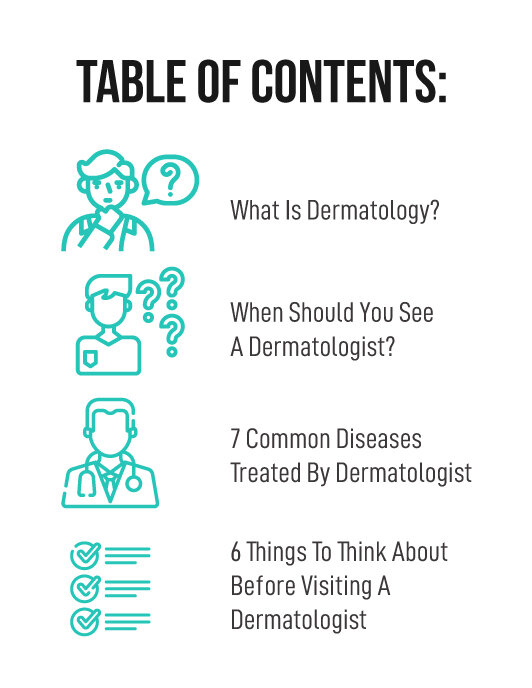
What Is Dermatology?
Many people today have a misunderstanding of the word “dermatology.”
They think of complex skin surgeries and procedures – things that you do only when you have serious skin issues.
And while it does include complex services, dermatology’s main focus is simple: to help you have healthier skin. When you have healthy skin, you are able to be more confident..
What does this mean for the average person?
No matter the skin issue, dermatology can help you achieve your goals and greet the world as the best version of yourself.
Dermatology is the branch of medicine dealing with the skin. It is a specialty practice with both medical and surgical aspects.
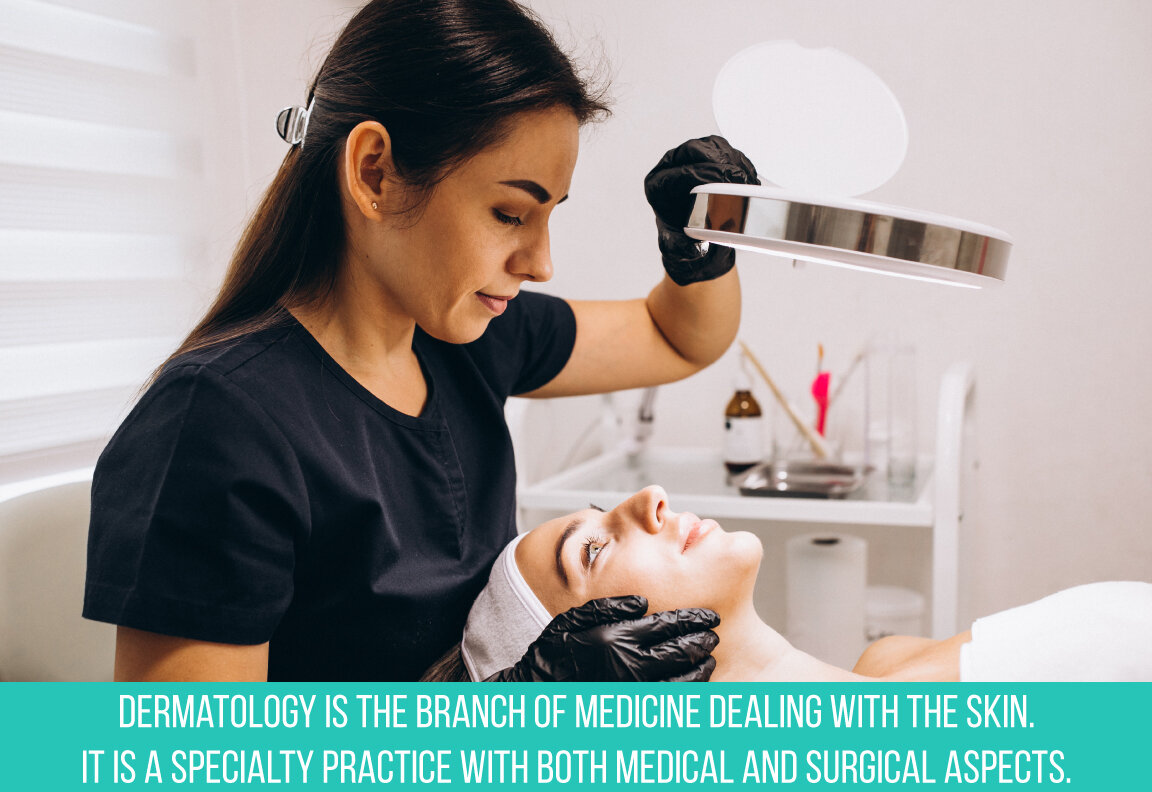
Dermatologists are real, medically trained doctors who have special training in the prevention, diagnosis, and treatment of skin, hair, and nail conditions. In fact, before they can begin practicing, dermatologists receive more than a decade of training, including:
- Four years of college to earn a bachelor’s degree
- Four years of medical school to become a medical doctor
- A one-year medical or surgical internship
- Three years of dermatology residency, working alongside board-certified and experienced dermatologists
In other words:
Dermatologists are highly trained medical doctors that can take care of the A-Z problems of your skin, hair, and nails – not just cosmetic procedures and pimple popping.
When Should You See A Dermatologist?
There’s a high chance you’ve experienced detrimental skin conditions like acne, an unsightly rash, or dry, itchy skin sometime in your life.
If so, you already understand exactly how irritating these issues can be!
Thankfully, many minor skin conditions disappear on their own as time passes. But sometimes they stick around – causing a lot of worrisome and sometimes intolerable symptoms.
You want to find relief, but you aren’t sure how.
That’s completely understandable – taking the first step towards health is often the hardest.
Let’s break it down so you can live comfortably in your own skin.

Diagnosis Of Skin Disease
Have you ever looked at an unfamiliar spot or blemish and wondered if it’s a blackhead, pimple, or sunspot?
Join the crowd! Skin conditions are hard to diagnose, sometimes even for medically trained doctors.
Why is this? Here are the main two reasons:
- Skin conditions can look different on different types of skin. For example, rosacea can take on 50 shades of red – anything from rosy cheeks to pimples that look like acne.
- Many skin conditions appear similar to each other. For example, a pink flaky spot or rash can be eczema, dandruff, ringworm, psoriasis, or even skin cancer.
As a result, many general practitioners who don’t have specialized experience with skin conditions lack the training and tools needed to diagnose them correctly.
We suggest seeing a dermatologist to streamline your treatment or ask your general practitioner for a referral to a dermatologist to make sure you have a proper diagnosis.
Treatment Of Skin, Hair, And Nail Disease
If you are suffering from a skin condition like severe acne or dry skin patches, visiting a dermatologist offers you the best chance of recovery. You should also visit a dermatologist when experiencing problems like hair loss or nail fungus.
If you are interested in cosmetic procedures, a dermatologist specializing in cosmetic procedures at DESSNA may be able to help you.
Cosmetic dermatologists offer minimally invasive skin procedures such as Botox injections, dermal fillers, PRP injections for hair loss, laser skin resurfacing, microneedling, laser hair removal, chemical peels and sclerotherapy for those pesky spider leg veins.
Let’s dig a little deeper and get into some of the specific skin conditions that are commonly treated by dermatologists.
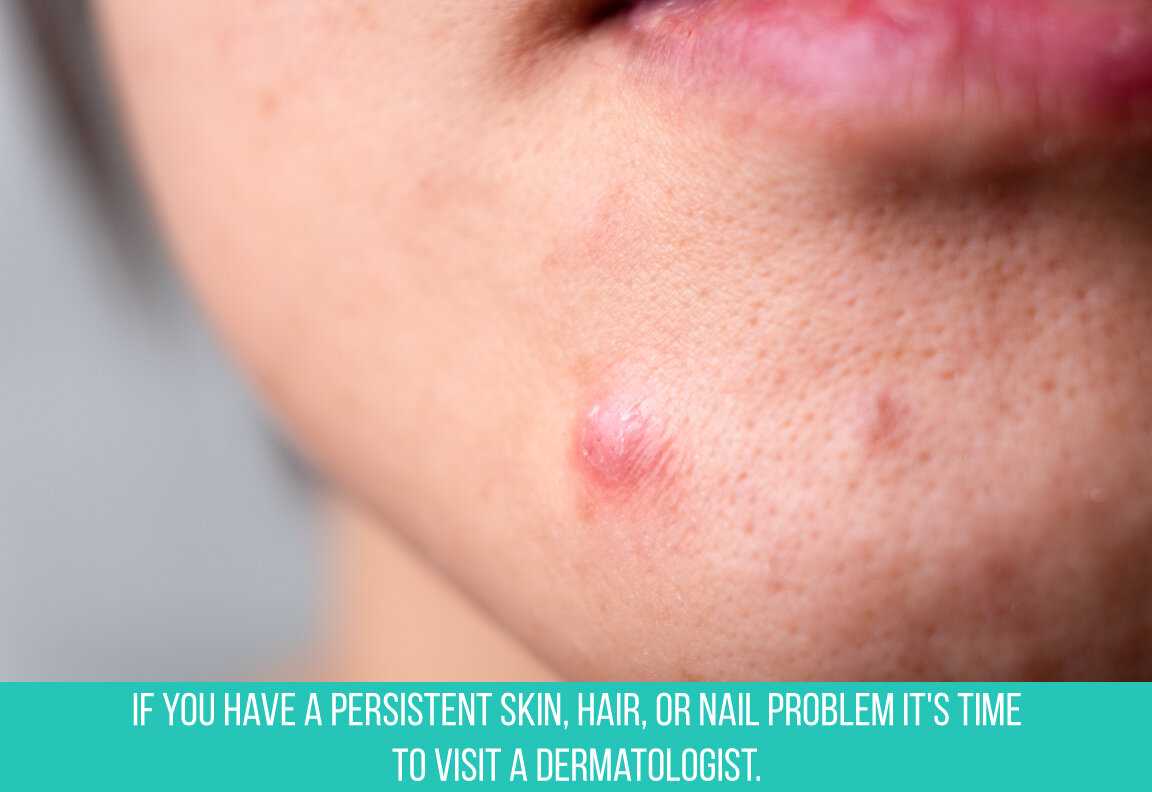
Common Diseases Treated By Dermatologist
Dermatologists treat a wide array of skin, hair, and nail diseases. And the chances are high that you can get help if your skin, hair, or nails are suffering.
Here are several diseases commonly treated by dermatologists.
Acne
It’s almost certain that you’ve dealt with an irksome pimple at least once or twice in your life. In fact, the American Academy of Dermatology records that acne is the most common skin condition in the United States.
While many people find their acne disappearing as they leave adolescence, others find it sticking around like a bur in a wool coat.
If this describes you, you are not alone: adult acne is one of the most common skin conditions, and it’s a common misperception that acne resolves with adolescence.
If you find yourself in this group, or if your acne is severe, you should consult a dermatologist.
Thankfully, almost all cases of acne can be effectively treated.
Mild cases of acne may respond well to a topical retinoid, whereas more moderate cases may require an antibiotic or other medication. When acne is severe, it may need treatment with isotretinoin (the active ingredient in Accutane).
Alopecia
Hair is a mark of beauty for humans. In fact, the average American consumer spends around $90 a month on their hair in many parts of the United States.
Unfortunately, if you are suffering from alopecia, you know just how distressing losing your hair can be
Alopecia is the medical term for hair loss. This can come in many different forms, ranging from gradual and sudden hair shedding or loss of large clumps of hair.

The causes and treatment of alopecia varies widely based on the type of hair loss. We recommend seeing your dermatologist as soon as possible for accurate diagnosis and to establish an effective treatment plan for regrowth.
Diagnosing and treating alopecia quickly is critical to minimize the risk of permanent hair loss.
Psoriasis
Psoriasis is an immune-mediated disease in which skin cells build up and form scales and itchy, dry patches of skin.
In essence, your skin is replacing itself too quickly which results in the accumulation of silver scales on the surface of your skin.
It is not contagious, but it can flare up causing the symptoms to get worse – and at times psoriasis can be disfiguring, uncomfortable, and even painful.
Although psoriasis is chronic, clear skin is attainable due to more treatment choices than ever before.
To treat psoriasis, many people apply medication directly to their skin. If you need a stronger treatment, Xtrac laser and medications are available. These medications, called biologics, work throughout the body.
Nail Fungus
Nail fungus is a common condition that begins as a white or yellow spot under the tip of your fingernail or toenail. As the fungal infection goes deeper, nail fungus may cause your nail to discolor, thicken, and crumble at the edge.
While nail fungus is not usually painful, it is often unsightly, and sometimes causes a smelly odor.
That’s why most people want to get rid of the nail fungus once and for all!
Unfortunately, nail fungus can be difficult to treat. Starting with an over-the-counter product sometimes works, but if that doesn’t help you’ll have to turn to the experts.
Common strategies from dermatologists include:
- Oral antifungal drugs
- Medicated nail polish
- Medicated nail cream
- In extreme cases, surgery
Eczema
Eczema is a common skin condition that affects over 10% of the American population.
There are many different types of eczema, but the most common type is atopic dermatitis.
Atopic dermatitis is common in infants. However, an estimated 60% of children will no longer show symptoms by adolescence. If you are wondering if you are dealing with eczema, here are a few things to watch for:
- Dry, scaly skin
- Skin flushing
- Itching
- Open, crusted, or weeping sores
Eczema and psoriasis can be very similar, but there are some differences. For example, eczema causes an intense itch, while many claim that psoriasis stings or burns – like getting bit by fire ants.
There is currently no cure for eczema. Treatment for the condition aims to heal the affected skin and prevent flares of symptoms.
There are plenty of home remedies for eczema such as taking lukewarm baths, applying moisturizers, and using a humidifier.
If the symptoms and itch continue despite the home remedies above, please see your dermatologist for additional treatment options for relief.
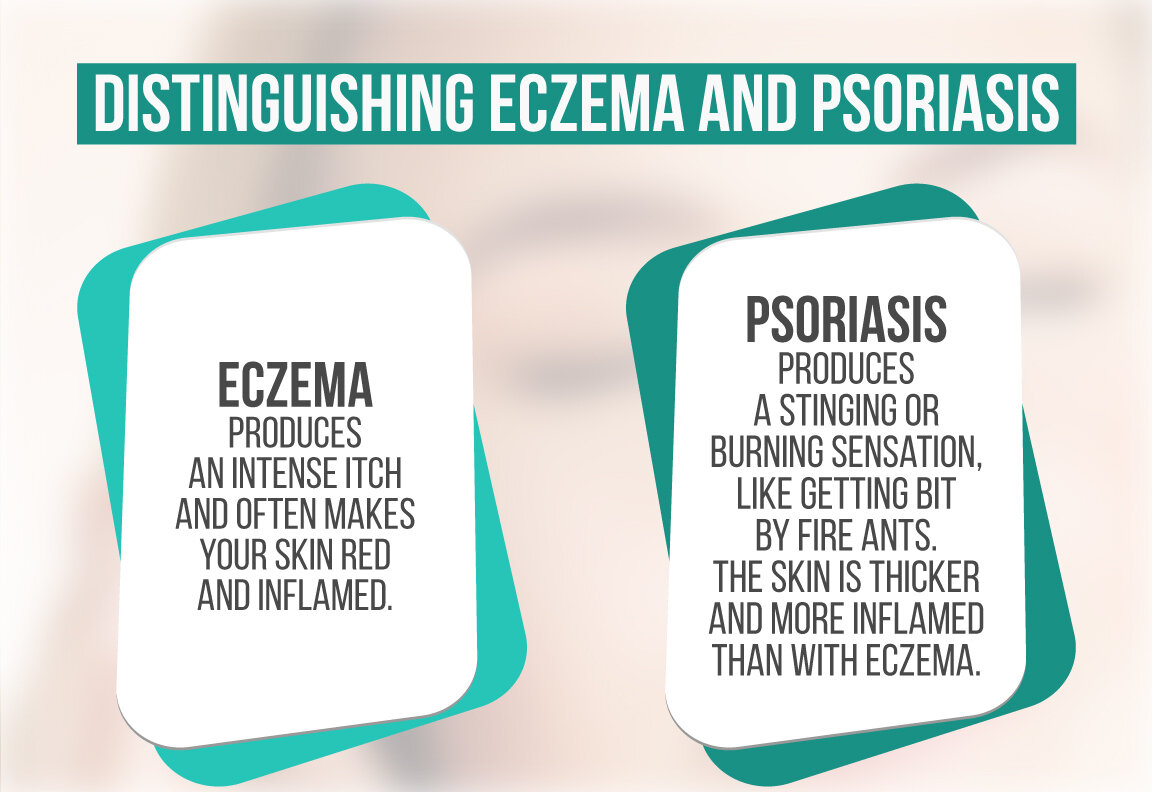
Skin Cancer
Skin cancer is an abnormal growth of skin cells – most often caused by the sun’s harmful rays.
There are three common types of skin cancer:
- Basal cell carcinoma is the most common type of skin cancer. It often appears like a flesh-colored round growth, pearl-like bump, or pinkish patch of skin. It is usually treatable, especially if caught early. However, if left to grow untreated, it can eat through the skin, cartilage, muscles, and nerves causing damage and disfigurement.
- Squamous cell carcinoma (SCC) is the second most common type of skin cancer. It often appears as a red firm bump, an itchy, scaly patch, or a sore that never seems to heal. Early diagnosis and treatment is critical as more people currently die from squamous cell carcinoma than melanoma each year. This is due to the sheer number of SCC cases as well as recent advances in melanoma awareness and treatment.
- Melanoma is often considered the most serious skin cancer due to its capability to spread and metastasize to other parts of our bodies quickly in aggressive cases. Melanoma may develop in an existing mole, but more often it actually appears as a new dark, pink, and even flesh-colored spot on the skin. Melanoma can be fatal, so early diagnosis and treatment are crucial.
While many skin diseases are irritating and painful, skin cancer is the most deadly of skin diseases. Confined to the skin, the lesions are usually treatable and early diagnosis and treatment are critical to reduce morbidity and mortality.
In short:
If you see a spot on your skin that is changing or resembles skin cancer, visit a dermatologist as soon as possible!
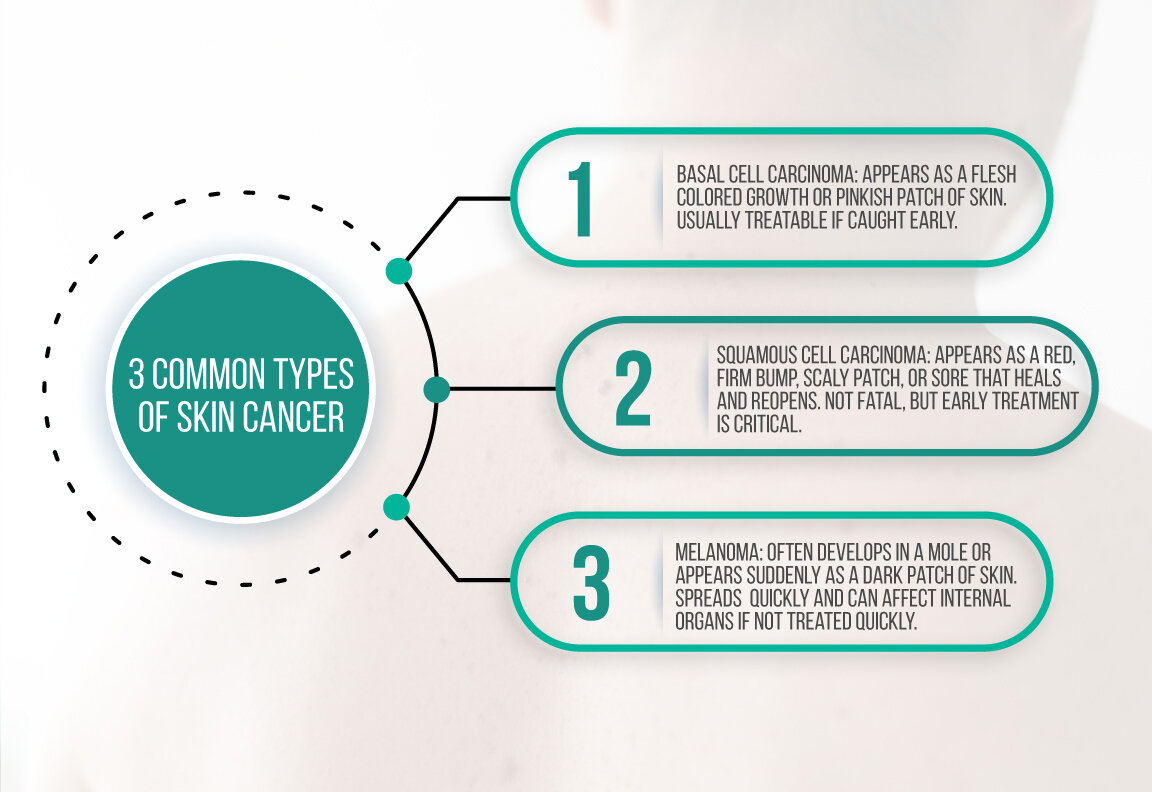
Warts
Warts are flat-out frustrating. They are embarrassing and sometimes difficult to get rid of.
Warts are caused by a virus that creates an infection in the skin once contact is made. This is more likely to develop on broken skin since the virus can enter the top layer of skin through open wounds.
Warts can spread very easily from encountering a wart on someone else’s body, or surfaces that touched someone’s warts, such as towels or bath mats. Warts can also spread from one area of your body to another.
For this reason, it is important not to pick at your warts!
Your best plan of action is to visit a dermatologist who can painlessly take care of your warts once and for all!
Of course, these are just a few of the most common conditions treated by dermatologists. To learn more, contact the DESSNA team or visit our website for a comprehensive list of dermatology services.
Things To Think About Before Visiting A Dermatologist
Perhaps you’ve realized that you have a skin, hair, or nail condition that can be treated by a dermatologist. Or maybe you’re now ready to take the first step and visit a dermatologist.
Either way, walking in the door of a dermatologist’s office can still seem intimidating at first!
What will be expected of you? Will you have to unrobe? Do you need any papers? What kind of questions will you have to answer?
Don’t worry – visiting a dermatologist doesn’t have to be scary.
Here are a few things to remember when visiting for the first time.
Check With Your Insurance Provider
Insurance providers typically provide coverage for treatments for chronic skin conditions like psoriasis, acne, eczema, and cancer; but if there is ever any question about a covered benefit, please contact your insurance company.
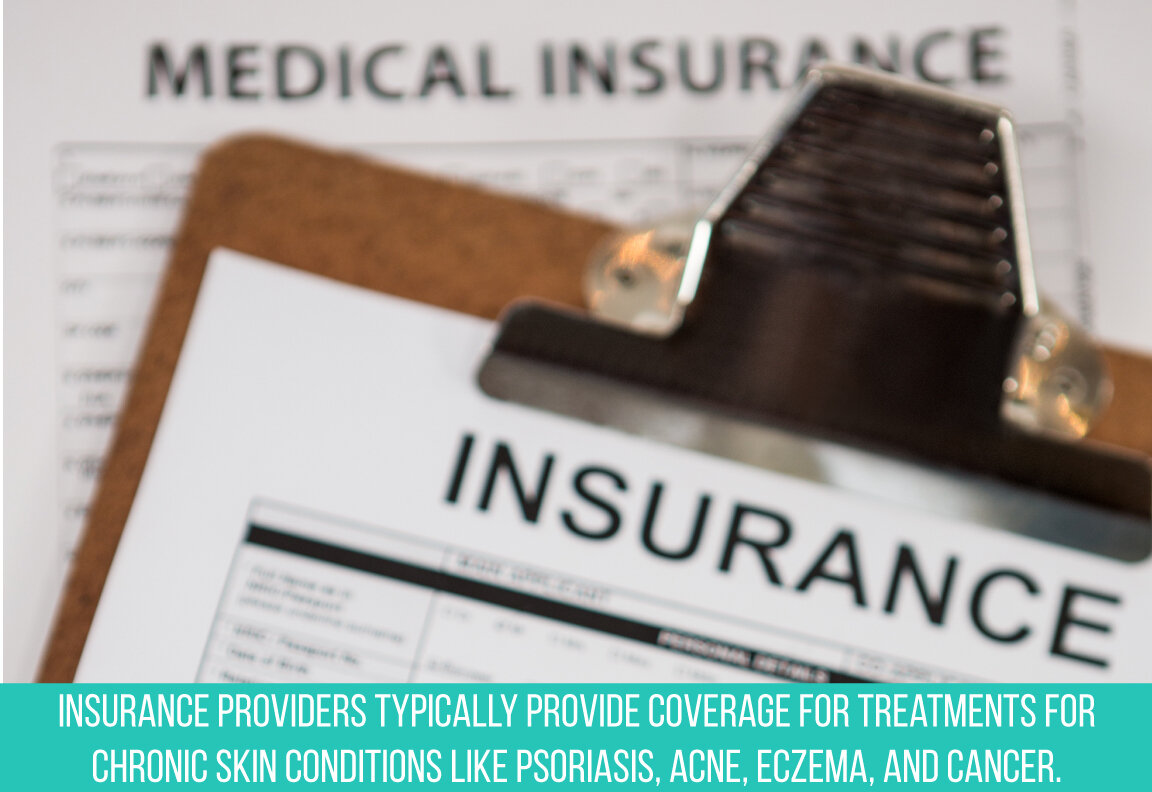
Our clinic staff will also confirm with you if we accept your insurance plan – we accept most insurance plans.
Most insurance plans cover dermatology visits. However, keep in mind that some cosmetic treatments such as CoolSculpting, Botox, or other injectables are not covered by insurance.
Prepare Your Questions And Concerns
Something inside of us hesitates to lay out our questions and concerns to medical doctors. We want to appear healthy and strong!
But doing so robs you of the full benefit of your visit to the dermatologist.
It’s like a child who refuses to admit they don’t understand a math lesson. The teacher is there to help them, but is helpless to do so if the child doesn’t ask their questions.
So, start your visit knowing what you want to ask. Make a list of things you are anxious about, pre-existing medical conditions, and concerns you have.
While it may feel whiny or unnecessary, a dermatologist is there to help you toward health – and sometimes a simple reassurance is what you need.
With extra information prepared in advance, your dermatologist will have a better understanding of your medical background, skin issues, and any treatments you’ve received, which will allow your doctor to provide a treatment plan moving forward.
Prepare Necessary Identifications, Medical Cards, And Medical History
Your first visit to the dermatologist begins much as a typical visit to your primary care physician. They’ll ask about things like your medical history, medications, and health problems.
It’s important for your dermatologist to know your medical history so they can appropriately treat your acne. It’s all relevant, even the issues that aren’t directly related to your skin.
Before your visit, you may want to take a few steps to prepare:
- Write down any over-the-counter products you’re using.
- Write down any prescriptions you’re already taking.
- Consider your previous medical history and family history.
- Prepare any medical cards you might have.
With extra information prepared in advance, your dermatologist will have a better understanding of your medical background, skin issues, and any treatments you’ve received, which will allow your doctor to provide a treatment plan moving forward.

Getting Your Body Ready For A Dermatologist Exam
It’s best to skip thick layers of makeup on the day of your exam.
However, don’t make the mistake of thinking the dermatologists only want to see your “bare face.”
You don’t have to skip your daily skin care regimen, especially if you are using prescription medicine to treat specific skin conditions. Ultimately, your dermatologist will want to assess how your skin is reacting to the medication.
Your Skin Exam
Don’t be surprised if you’re asked to disrobe and put on a cloth or paper gown. If it’s the first time you’ve ever seen a dermatologist, you may be due for a full-body check for other skin problems.
Although this may seem odd if you’ve made an appointment for a specific issue, remember that your dermatologist is there to help you with all your skin problems – even the ones you may not know about yet.
If hearing this causes you to break out in a sweat and get weak in the knees, take a deep breath.
Dermatologists are medical professionals who genuinely want to help and have their patients’ best interests at heart.
You should feel comfortable with this person, and your dermatologist should act professionally and respectfully.
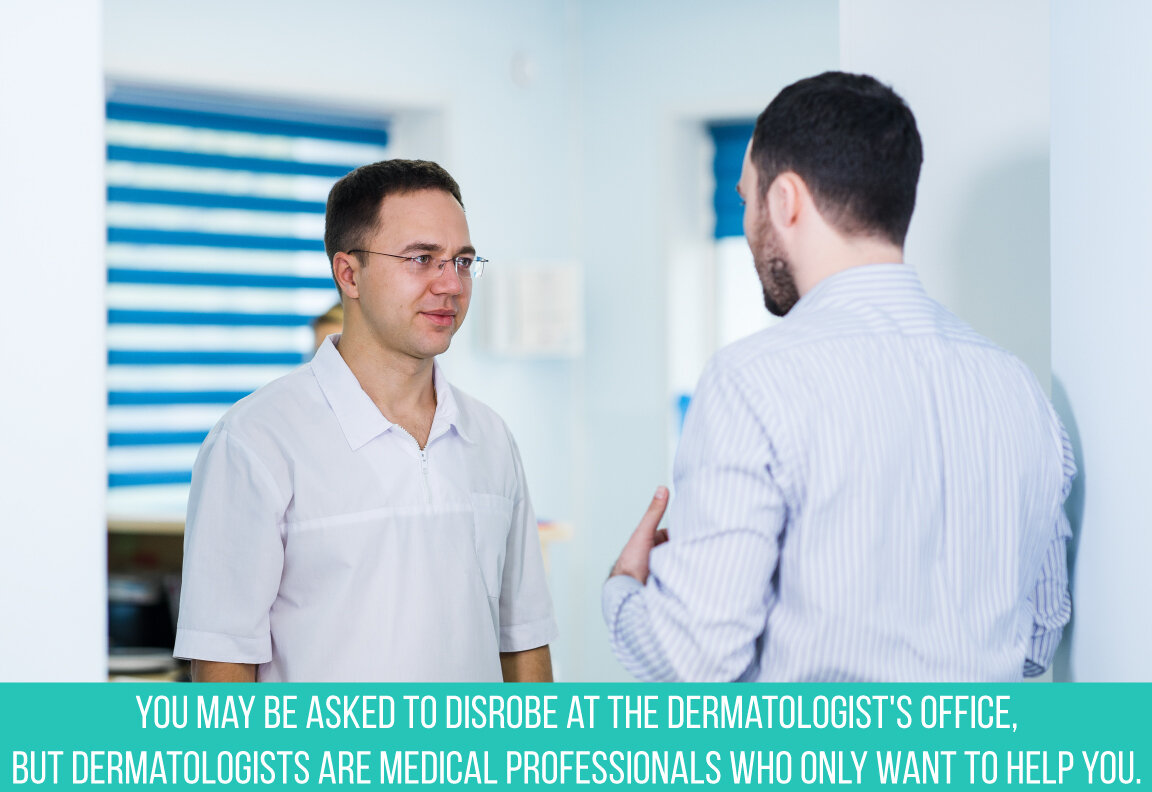
Don’t Expect A Quick Fix
It would be amazing if all you had to do was make one appointment, get medication, and never have to worry about your condition again.
Unfortunately, skin, hair, and nail issues don’t usually work that way.
If you’re undergoing treatments for chronic skin conditions, expect some trial and error before you get the results you actually want.
Keep in mind that different patients experience varying results. Someone with your exact skin type might get amazing results in minimal time, while you might have to wait weeks before seeing the slightest improvement.
Even then, in some circumstances, the most that your dermatologist might be able to accomplish is getting your condition under control.
Once you get significant results, your dermatologist will still want to see you periodically to make sure that the medication you have is working well, that you aren’t bothered too much by side effects, and to simply monitor the overall health of your skin.

Conclusion
You don’t have to suffer from maddening and painful skin, hair, or nail conditions. Take the time to visit a reputable, board-certified dermatologist so you can focus on the things that matter to you!
If you are looking for a dermatologist in North Atlanta, or more specifically the East Cobb area, contact DESSNA today.
We are proud to offer 30 years of experience in the field of dermatology. We also offer other skin, hair, and nail services like:
- Skin surgery procedures like Mohs surgery, surgical excision, and benign mole removal.
- Aesthetic treatment procedures like chemical peels, Botox, laser and resurfacing therapies, and laser hair removal
In all we do, we promise to respect you and keep your best interest in mind.
And the best part?
Working with us is easy!
Simply schedule an appointment to get started, and we’ll take it from there. Your first step toward skin, hair, and nail health is that easy.
We look forward to working with you in your journey towards beautiful, healthy skin!
